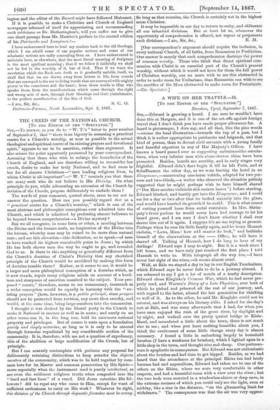THE CREED OF THE NATIONAL CHURCH. [To THE EDITOR OF
THE " SPECTATOR."]
Sin,—To answer, as you do to " W. T.'s " letter in your number of September 7, that " there is no bigotry in assuming a practical centre for a Church's worship, as near as possible to the actual theological and spiritual centre of its existing prayers and devotional spirit," appears to me to be assertion, rather than argument. It also misses the point apparently presented by your correspondent. Assuming that those who wish to enlarge the boundaries of the Church of England, and are therefore willing to reconsider her creeds, desire to make her truly National, and to find room in her for all sincere Christians—" men leading religious lives, to whom Christ is all-important"—" W. T." reminds you that there are many such who do not believe in His Divinity. On what principle do you, while advocating an extension of the Church by revision of the Creeds, propose deliberately to exclude these ?
The words of your comment, quoted above, seem to me not to answer the question. How can you possibly regard that as a " practical centre for a Church's worship," which is one of the most abstruse and philosophic conceptions ever admitted into the Church, and which is admitted by professing sincere believers to be beyond human comprehension—a Divine mystery ?
But we all recognize, in some form or other, a meeting between the Divine and the human souls, an inspiration of the Divine into the human, whereby man may be raised to be more than natural man ; and see this elevation—this deification, so to speak—of man to have reached its highest conceivable point in Jesus ; by which He has both shown man the way he ought to go, and revealed God to us. Is there in this anything so generically different from the Church's doctrine of Christ's Divinity that any cherished principle of the Church would be sacrificed by making this form of doctrine tenable there? Rather, as it seems to me, it would be a larger and more philosphical conception of a doctrine which, as it now stands, repels many religious minds on account of a hard- ness and sharpness of assertion unsuited to the subject. Your pro- posed " centre," therefore, seems to me unnecessary, inasmuch as a wider conception would be equally in harmony with the " ex- isting prayers" (here, however, is a petitio principii, since prayers should not be protected from revision, any more than creeds), and would, at the same time, bring large numbers into the communion.
I thought it was desired by the liberal party iu the Church to make it National in essence as well as in name ; and surely on no other terms can it, in the long run, hold its enormous national property and privileges. But of course it rests upon a foundation purely and simply sectarian, so long as it is only to be entered through formulas repudiated by any considerable section of the community. It is, therefore, with me not a question of expediency, this of the abolition or large modification of the Creeds, but of principle.
But I can scarcely contemplate with patience any proposal for deliberately retaining distinctions to keep asunder the disjecta membra of the community, which was to be held together by com- mon love for its Master and common penetration by His Spirit— more especially when the instrument used is purely intellectual, as are even the sublimest religious truths when congealed into the "hard and fast lines" of a creed. Did Jesus catechize His fol- lowers? did he repel any who came to Him, except for want of sufficient enthusiasm to carry on His work? Whatever be right, this division of the Church through dogmatic formulas must be wrong. So long as that remains, the Church is certainly not in the highest sense Christian.
It may be impossible in our day to return to unity, and obliterate all our inherited divisions. But at least let us, whenever the opportunity of comprehension is offered, not repeat or perpetuate [Our correspondent's argument should require the inclusion, in every national Church, of all faiths, from Romanism to Positivism. Our answer is merely that such comprehension destroys the power of common worship. Those who think that direct spiritual com- munion with Christ is an essential part of the Church's present worship, without which it would not have for them the full power of Christian worship, can no more wish to see this abstracted in order to make room for Unitarians, than Romanists can wish to see the sacrifice of the Mass abstracted to make room for Protestants.
— ED. Spectator.]






























 Previous page
Previous page